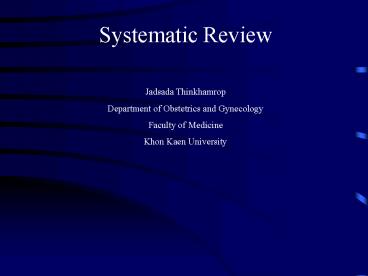Systematic Review - PowerPoint PPT Presentation
1 / 36
Title:
Systematic Review
Description:
in severe malarial anaemia. Possible benefits. Higher survival. Shorter stay. Anaemia cured quickly. Possible harms. Death from transfusion. Transfusion reactions ... – PowerPoint PPT presentation
Number of Views:80
Avg rating:3.0/5.0
Title: Systematic Review
1
Systematic Review Jadsada Thinkhamrop Department
of Obstetrics and Gynecology Faculty of
Medicine Khon Kaen University
2
- Outline of presentation
- Introduction
- Limitation of tradional review
- Benefit of systematic review
- Research design
- Steps of systematic review
- Source of systematic data base
3
- The need for Research Synthesis
- Bloodletting standard treatment for eclampsia
- Routine episiotomy
- Corticosteroid therapy for women at risk of
giving birth prematurely
4
Rationale of research synthesis 1. To keep up the
evidence that is accumulating in the field of
interested 2. Objective appraisal of the
evidence 3. Enhance precision of estimates of
treatment effect 4. Potential to more timely
introduction of effective treatments 5. Identify
areas where further studies are needed
5
Limitation of traditional review 1. Bias from
reporting and publication policies 2. The absence
in published studies of specific data needed for
the review 3. Investigator bias from subjective
inclusion of studies 4. The uneven quality of the
primary data 5. Improper attention to statistical
methods 6. Bias interpretation of outcome
6
Benefit of systematic review 1. Clear statement
of the problem/objectives/hypothesis 2. Explicit
statement of inclusion and exclusion criteria 3.
Method for locating research studies 4.
Classification and coding of study unit 5.
Quantitative measurement of study
characteristics 6. Quality assessment of the
methods used in the studies 7. Determining the
homogeneity of the data 8. Appropriate
statistical models
7
Research design 1. Observational study 1.1
Epidemiological study 1.2 Cohort study 1.3
Case-control study 2. Experimental study 2.1
Randomised controlled trial 2.3 Non-randomised
controlled trial (quasi randomised controlled
trial)
8
Appraise the evidence Assessing the
validity Type of studies 1. Meta-analysis of
RCT 2. RCT 3. Non-randomized controlled trial 4.
Observational studies 5. Expert opinion
9
Steps of research synthesis
- Background
- Objectives
- Criteria for inclusion
- Search strategy
- Methods of applying inclusion criteria, quality
assessment, data extraction and analysis
10
Review question?
- What is the intervention?
- What are the possible benefits?
- What are the possible harms?
- Why is the question important?
11
Routine blood transfusion in severe malarial
anaemia
- Benefits and harms
12
Possible benefits
- Higher survival
- Shorter stay
- Anaemia cured quickly
13
Possible harms
- Death from transfusion
- Transfusion reactions
- HIV, hepatitis B infection
14
Other
- Considerable resource implications
- Requires high level of nursing staff
15
Protocol
- Background
- Objectives
- Criteria for inclusion
- Search strategy
- Methods of applying inclusion criteria, quality
assessment, data extraction and analysis
16
Criteria for inclusion
- Types of study (usually RCT)
- Types of participant
- Types of intervention
- Types of outcome sought
17
Steps
- Develop protocol
- Protocol refereed
- Modify protocol
18
Search
19
Apply inclusion criteria
- Needs two people
- Need someone experienced
- Use single form
20
Extract data (3 sorts)
- Descriptive data
- Quality assessment
- Outcomes
21
Enter data
- Descriptive-table
- Quality-narrative
- Outcomes-highly structured
- Standard software
22
Report on findings
23
Discussion
- Brief
- Biases
- Write implications for research
- Write implications for practice
24
Submit
- Editor comments
- Referees comment
25
UPDATE!
26
(No Transcript)
27
(No Transcript)
28
(No Transcript)
29
(No Transcript)
30
(No Transcript)
31
(No Transcript)
32
(No Transcript)
33
(No Transcript)
34
(No Transcript)
35
(No Transcript)
36
(No Transcript)































